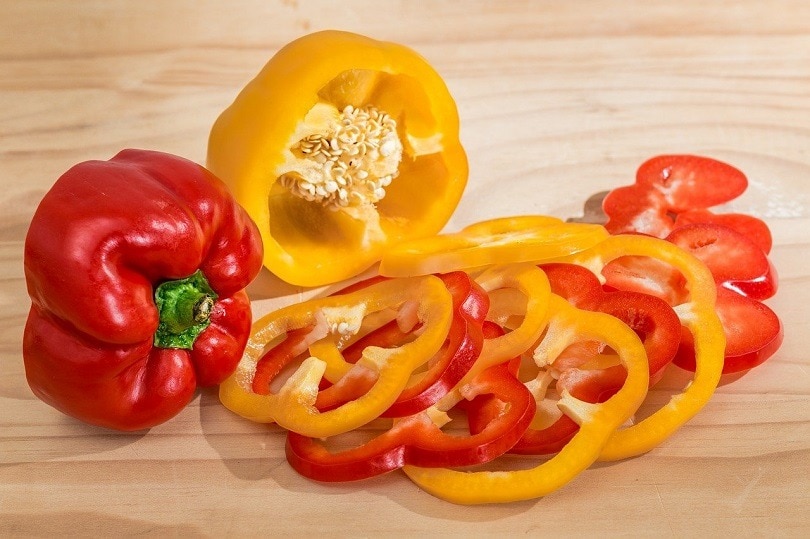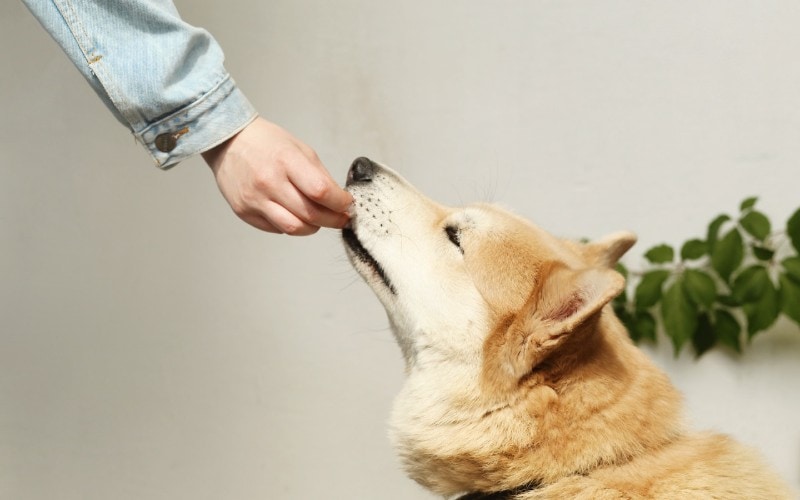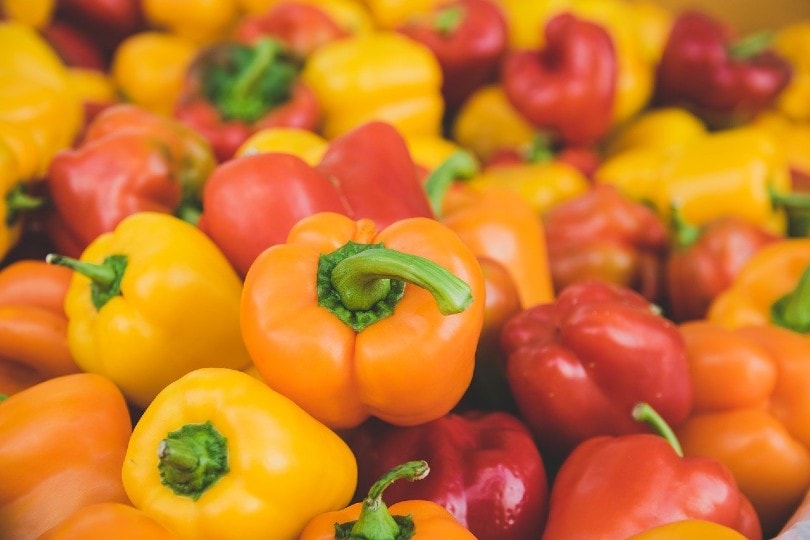Click to Skip Ahead
If you have a dog, you know they love meat, which isn’t surprising since they were once predators that hunted other animals to survive. What is surprising is how many other foods the average dog loves, from bananas and cheese to blueberries, carrots, and green beans! But what about bell peppers? If prepared correctly, bell peppers make an excellent snack for your canine!
We’ll discuss how to prepare them and the nutritional benefits they provide. We’ve also included fascinating facts and a helpful list of bell pepper FAQs!

Which Nutritional Benefits Do Bell Peppers Provide to Your Dog?

Bell peppers, especially yellow and red bell peppers, offer a surprising number of nutrients that benefit your hound’s health. Let’s quickly examine the nutrients and benefits bell peppers can offer your dog.
- Vitamin A (beta-carotene) for their eyes and immune function
- Vitamin C, a powerful antioxidant
- Vitamin E, an antioxidant
- Vitamin B6 for their brains and blood
- Vitamin K for healthy bones and blood clotting
- Fiber, which helps your dog’s digestion and keeps them regular
Which Bell Pepper Color Is Best for Dogs?
Bell peppers come in either green, red, or yellow. While you might think green bell peppers are the most nutritious (like most green vegetables), red bell peppers come out on top regarding nutritional value.
It’s also worth noting that, aside from their fiery-red color, red bell peppers are sweet and not spicy, which is why dogs enjoy them. Generally, most sweet peppers are OK to feed to your dog.
How Much Bell Pepper Can Your Dog Eat?
Bell peppers aren’t a food that dogs would naturally eat in the wild, so they’re good as an occasional, healthy snack but not recommended as part of the regular diet.
Two thin slices of bell pepper is usually fine for small dogs, while larger dogs can eat half a bell pepper with no problem. Always introduce new foods gradually and watch for any adverse effects before increasing the amount you are giving.
Peppers and other treats should only make up 10% of your dog’s daily nutrition, and the remaining 90% should be high-quality dog food. Your vet is your best source of individual advice on your dog’s diet and they will base their recommendations on their age, size and any underlying health conditions.

How To Prepare Bell Peppers for Your Dog
Although bell peppers’ seeds, stems, and cores aren’t toxic, they can cause an upset tummy, so it’s best to discard them. Below is a step-by-step list of how to prepare bell peppers for your pepper-loving canine.
- Clean the bell pepper well with water
- Core the bell pepper and throw away the core, seeds, and any stem pieces
- Cut the pepper into easy-to-eat slices for your dog
- Feed the slices one at a time
You can also cook bell peppers for your dog, but they must be cooked plain with no onion, garlic, salt, or butter. Steaming them in the microwave works well, but let them cool before feeding so your dog doesn’t burn their mouth or tongue.
Do Bell Peppers Pose any Health Risks for Your Dog?
While bell peppers aren’t toxic, too many of them at once can cause your dog to vomit, have an upset stomach, have diarrhea, or all of the above. Dogs don’t usually eat many vegetables in one meal, and when they do, it can overload their digestive system. A well-balanced diet with a small portion of bell peppers served occasionally is best.
Speaking of health risks, spicy peppers can cause your dog a great deal of gastrointestinal distress. They contain capsaicin, which gives them their spicy flavor. Capsaicin can also burn your dog’s mouth and tongue, so you should avoid feeding dogs jalapeño peppers, habanero peppers, or anything spicier than a bell pepper.
Lastly, your dog could have an adverse reaction to bell peppers. Some dog’s have more sensitive tummies and any additions to their diet can lead to an upset stomach.


FAQ for Feeding Bell Peppers to Your Dog
Can Puppies Eat Bell Peppers?
Yes, puppies can eat bell peppers. It’s best to check with your vet before feeding them and introduce them slowly to be sure no tummy issues occur.
What Color of Bell Pepper Is Best for Dogs?
Red bell peppers provide the most nutrients.
Can Dogs Eat Bell Peppers Every Day?
While not toxic, they should only be fed in moderation. Once or twice a week is a good schedule if your dog truly enjoys them.
Are Any Parts of the Bell Pepper Plant Toxic to Dogs?
There’s nothing toxic on a bell pepper plant, but it’s recommended to toss the core, stem, and seeds.
Are Bell Peppers a Healthy Snack for Dogs?
Yes, bell peppers are nutritious and make an excellent occasional snack for most dogs.
How Should You Feed Bell Peppers to Your Dog?
Serving raw bell pepper slices is the easiest way to feed them to your canine companion. However, some dogs might enjoy bell peppers more when peeled and cooked.
Final Thoughts
Bell peppers, especially the red ones, can make an excellent snack for dogs in moderation. They contain beneficial nutrients and are easy for most dogs to eat and digest. Of course, dogs don’t need to eat bell peppers and they should be getting all their essential nutrients from a high quality, balanced dog food. Bell peppers should be treated as an occasional healthy snack rather than part of your dog’s diet. As with all new additions to your dog’s diet, get the go ahead from your veterinarian first. This is especially important if your dog has any underlying health concerns or is on a special diet.
Featured Image Credit: KaiPilger, Pixabay










